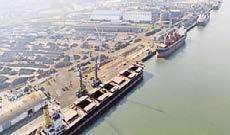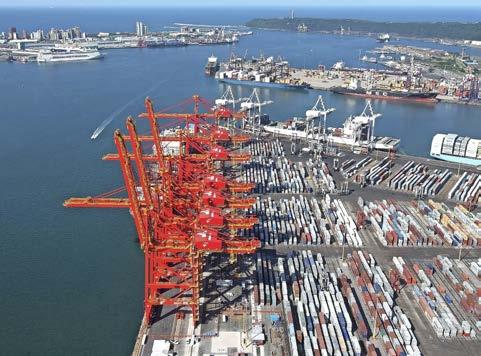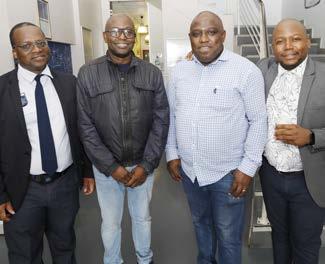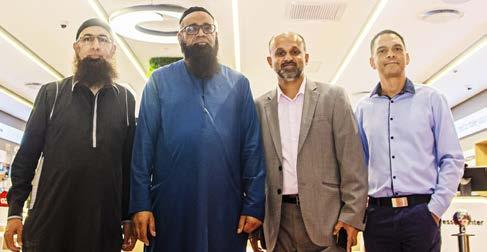TUESDAY, JANUARY 31 2023











MARYANNE ISAAC
DESPITE challenges and deterring factors impacting on KwaZulu-Natal’s readiness to welcome foreign and domestic tourists during the recent festive season, the province was still a popular domestic leisure tourist destination.
This is according to KZN MEC for Economic Development, Tourism and Environmental Affairs (Edtea) Siboniso Duma, who released the preliminary tourism statistics for the 2022 festive season.
“We are pleased with the festive season figures as they reflect the province’s tourism performance over one month of our summer season – note that the province’s summer season draws to a close at the end of March 2023. Therefore, I have no doubt that we will achieve our target.”
In early December, Edtea projected an estimated 760 000 domestic trips and 58 000 international visitors over the entire summer season. In December, KZN welcomed 520 000 domestic tourists and 51 000 international tourists, providing a R2.4 billion injection into the provincial economy (provincial GDP).
“We have no doubt that our efforts to revive the tourism sector will yield a positive outcome. The role of the tourism sector in the economic transformation of our country and our province is immeasurable. Hotel and other accommodation occupancy rates are a good indicator of how well tourism is doing,” added Duma.
At the beginning of December, Tourism KwaZulu-Natal research estimated average hotel occupancy rates for KZN would reach 60% during Christmas and the New Year.
Preliminary actual weekly occupancies for hotel occupancy showed from December 19 to 25, KZN’s average hotel occupancy rate was 57% – 3% lower than the projections. However, from December 26 to January 1, the situation improved with the average occupancy rate reaching 81%.
The KZN tourism trade on the North Coast, in Durban and on the South Coast have all indicated bookings increased substantially for the Christmas week until the New Year. From a slow start at the beginning of December, many upmarket hotels saw occupancies rise from around 70% to 90% to fully booked.
The department believes the reason behind the initial low holiday bookings was the closure of the Durban beaches.

“We are happy there were no major incidents that spoilt what was undoubtedly once again a memorable experience for our visitors. KwaZulu-Natal is by far the most popular domestic leisure tourist destination for South Africans and this past month was no different,” said Duma.
Tourism KwaZulu-Natal acting chief
executive Nhlanhla Khumalo said the province would welcome the Midmar Mile on February 11, the Dusi Canoe marathon from February 16 to 18, and an array of business tourism events.
“We are confident we will achieve our projected economic impact for the summer season of R4.1bn, based on a projected final occupancy rate of 70% by the end of the financial year.”

However, tourism and hospitality businesses in the Midlands felt the pinch over the holidays. Marian Evans, general manager of the Midlands Meander, said while it was too early to give statistics, the sense was visitor numbers were lower than the previous season.

“There were challenges with erratic water supply, load shedding and the N3





roadworks. The cost of buying and running generators has been astronomical and has had a serious economic impact.”




Meanwhile, the 2022 festive season was a great one for the KZN South Coast. With several tourism engagements and attractions opened to the public, the tourism entity in the region said it had received positive feedback from establishments.
“As a popular seaside holiday destination, we were fortunate that our beaches remained safe and open for bathing for the duration of the season, with the exception of Scottburgh Beach which had to be temporarily closed following heavy rains.
“Shortly before the start of the festive season, it was also announced that we had retained Blue Flag status at six of our beaches, and another five attaining pilot status, underscoring the commitment to health and safety,” said Phelisa Mangcu, CEO of South Coast Tourism.
On the other hand, eThekwini faced criticism and the ire of locals over the handling of the closure of several beaches due to high E coli levels found in the water as a result of sewage spills.
The number of tourists who visited Durban during the past festive season dropped by almost 200 000 compared to the same period in 2019 – the last normal holiday season before the pandemic – as tourists were deterred from holidaying in the city amid concerns of poor water quality at its beaches.
However the eThekwini Municipality said it was pleased with its festive season.
“Apart from enjoying the sea, sand, sun and surf, visitors were also treated to a number of signature events such as the Durban Jazz Festival, Fact Durban Rocks, Woz’e Durban and many more. The accommodation occupancy rate reached 65%. This translates into 702 735 visitors with a direct spend of R1.5bn, over R3.8bn contribution to GDP, and 7 775 jobs,” said eThekwini mayor Mxolisi Kaunda.

AS BUSINESSES contend with continuous load shedding, which is currently at Stage 4, research conducted by the Small Enterprise Finance Agency (Sefa) shows that small businesses are being severely impacted. Sefa conducted a research study on the impact of load shedding on its funded clients, and among the findings were:
¡ Most respondents indicated that they were highly reliant on electricity for their operations.
¡ About 71% of respondents indicated that they were negatively impacted by load shedding.
¡ The majority of the respondents will require an alternative power source to continue with their operations.
To mitigate against this impact, the Minister of the Department of Small Business Development, Stella Ndabeni-Abrahams, said she and her team were seized with trying to find solutions aimed at lessening the devastating impact of load shedding on small businesses.
The ministry said it was aware that SMMEs were particularly hard hit by continued power outages.
“Since many cannot afford alternative power sources such as generators, they are forced to pause trading during load shedding. The minister understands that some small businesses resort to selling perishable goods such as meat and vegetables at low prices, to avoid them rotting. It goes without saying that this eats away on their much-needed income,” it said.
The ministry said on the instruction of the minister, the department and its agencies, in consultation with different stakeholders within and outside of government, were working on an energy-relief package for the small, medium, informal and micro sectors.
It said the details of the package, the criteria and application process for the relief will be announced soon.
Minister Ndabeni-Abrahams said: “Our aim is to find immediate solutions that can be urgently effected to avoid disastrous consequences, such as the closure of small businesses and job losses in the SMME sector. This sector was devastated and is still barely recovering from the ruinous effects of Covid-19. We cannot afford losing more businesses and jobs.”
THE Mercury Network sat down with the legendary Leonard Baumann of Bakers Limited – who celebrated his 100th birthday in December.

The business tycoon and now philanthropist is also a published author of A short history of the biscuit industry in South Africa.
Tell us a bit about the young Leonard Baumann, and what were your dreams as a young man?
I was born in Empangeni, Zululand. My parents were farmers and they sent me to a school in Durban. Later I became a boarder at the Durban Preparatory High School. After high school I went to Johannesburg, where I studied to become an accountant.
I had no idea what I wanted to be when I grew up, but my grandfather advised that I should not be a baker – I should rather become an accountant, as they needed somebody in the business world.
How did the name Bakers Limited come about?
My grandfather had a bakery and the company name was L Baumann and Company. He later decided to change this name. He had a chat with his friend and they decided to change the name to Bakers Limited – after all, the company produced bread.
Tell us about the “Bakers Man” logo and how it came about.

My uncle thought that Bakers should have a logo of some sort. He spoke to a man named Selby, who suggested that the logo should be a little man holding a tin of biscuits. However, the picture has changed over the years.
How did you successfully grow the business after taking over?
We started taking over other companies. We took over Wimpy and Pakco, and several companies came to me asking me to buy them out.
Although I said that I didn’t really want to buy anyone out, we ended up buying all the biscuit factories in South Africa.
I was also chairman of Pyott Biscuits for a while. Funny enough, when Pyott approached me, I said that we had four bakeries already and I didn’t want another biscuit factory. We also owned Duens Bakery and Baumanns Biscuit Company in Cape Town. We eventually had over 3 000 employees.
What are some of the challenges you’ve faced in business, and how did you overcome them?
The biggest challenge was that we had to be prepared to give authority to people to run bakeries, because I couldn’t do everything myself. So, I said that I would be prepared to be the chairman and give all the instructions, but a lot of other stuff you’ll have to do yourself. I had about six or seven good people around me, and made them the managing directors of different companies.
People have shared several messages on social media saying how Bakers was one of the best companies to work for. What did you do to make the company a place where people loved to work?
We were relaxed sort of people; we didn’t say you have to do this and do that. If we had a problem, we’d talk about it – we were a happy family.
BB Bread and the KwaZulu Development Corporation partnered to open a bakery in KwaMashu in 1982. Why KwaMashu when the bakery could have been opened anywhere?
There had been a law passed that no one could open a bakery in KwaMashu back then. The government then decided that they wanted to establish more employment in the KwaMashu area.
They (KwaZulu Development Corporation) came to us and asked us to partner with them, as they didn’t

ON 29 December 2022, the General Laws (Anti Money Laundering and Combating Terrorism Financing) Amendment Act was assented to by the President.
The legislation was rushed through Parliament at the end of 2022 as part of South African efforts to avoid greylisting.
Included in this legislation are amendments to the Trust Property Control Act and the introduction of a new definition of a ‘Beneficial Owner’ of a trust.
The new definition creates five broad classes of beneficial owners of a trust, namely:
– a natural person who directly or indirectly ultimately owns the relevant trust property;
– a natural person who exercises effective control of the administration of the trust arrangements that are established pursuant to a trust instrument;
– each founder of the trust;
– each trustee of the trust; and
– each named beneficiary in the trust deed.
The purpose of creating classes of beneficial owners is to place an obligation on the Trust and the Master to keep records of the individuals who fall within these classes which record will be useful to combat money laundering and terrorism.
Although it may have been unintended by the legislature, deeming every founder, trustee and named beneficiary to be a beneficial owner of a trust will have legal and tax consequences.
Beneficial ownership has a particular meaning. Beneficial ownership of the trust assets is different from “legal ownership” of trust assets which vests in the trustees responsible for administering the trust.
A trustee or founder cannot be said to be beneficial owners as they have no rights of use or enjoyment of the trust assets. Central to the concept of a trust is a separation between ownership or control and benefit.
A founder has no claim to the assets of a trust even if they once belonged
to him. Neither do trustees who are responsible for administering the assets. Furthermore, not all beneficiaries have a vested right to trust assets; for example, discretionary beneficiaries only have a contingent right to the assets.
The taxation of a trust beneficiary is triggered by that beneficiary acquiring a vested right to an amount or asset held by a trust. At the point of vesting the
know how to run a bakery.
What is your fondest memory as the Bakers Limited owner?
It was that sense of achievement –the fact that we could keep everything going and made everyone happy; it was a nice atmosphere.
Out of all your business achievements, which three are you most proud of?
I was a member of the Rotary Club of Durban and one of our achievements was the creation of Lifeline, Natal. Lifeline became very important and people volunteered their services; it was a very big achievement for us.
I was also part of a technikon college council that helped run the college. We didn’t get paid for this because it was a good thing to do.
Lastly, I am also currently the chairman of the SeaWorld Council. You are retired but still go to the office every day. What motivates you to do this?
When I retired, we sold the bakery business and vans. The question then was what to do now? There were charities that I was helping, and we needed an office somewhere where we could do all the paperwork. We still have about four or five charitable trusts, and those keep me busy.
beneficiary has use and enjoyment of the trust asset or amount and can said to be a beneficial owner.
Given that all parties to a trust (including the founder, trustees and discretionary beneficiaries) are to be deemed as beneficial owners there is likely to be some legal confusion on these parties’ rights and obligations.
The change to the Trust Property Control Act will only take effect upon proclamation by the President and therefore can still be amended.
| This article has been written by Graeme Palmer, a Director in the Corporate & Commercial Department of Garlicke & Bousfield Inc. For more information contact Graeme on telephone: +27 31 570 5496, email: graeme.palmer@ gb.co.za
NOTE: This information should not be regarded as legal advice and is merely provided for information purposes on various aspects of tax law.

FINANCIAL services institution, Ithala, says it is committed to revitalising the KwaZulu-Natal economy through its taxi finance service offering.
Ithala said that after the delivery of 10 taxis to the KwaMashu Taxi Association late last year, it had started the year with new taxis for the Inanda Taxi Association.
“We aim to ensure that we cement our relationship with sectors and industries through our various service offerings, and the taxi industry is one of the valued stakeholders we have partnered with for many years,” said Ithala SOC Limited chief executive, Dr Thulani Vilakazi.
During an event at Halfway Toyota Malanda in Umkomaas, the financial institution handed over another 10 taxis to eight women and two men.

One of the beneficiaries, Nomonde Ncanana, could not contain her excitement as she added another taxi to her fleet of vehicles.
“When I took over when my mother passed away in 2021, I was hesitant because the industry is dominated by men. It is often viewed as a ruthless industry but working with Mr Thomas Getsemane, our chairman, he has made it so easy for us as women.”
She said other banking institutions had been reluctant to assist her to grow

her business. “When our association approached other banks, they were reluctant but Ithala was the only financial institution that came through,” the 29-year-old said.
She added that she hoped that Ithala would continue to help small businesses.
During the event, Ithala committed itself to driving partnerships with taxi associations across KwaZulu-Natal.
“Our commitment to redefining wealth aims to transform sectors and industries. I am very pleased that most of the beneficiaries are women,” Vila-
kazi said. Another woman who benefited from the bulk-buying partnership is Sibongile Ntanzi, 65, who could not contain her excitement.
“I want to take this opportunity to thank Mr Getsemane who worked closely with Mr Thabani Mngadi from Ithala.
“Both these men played a crucial role in assisting us in achieving our goal. I will also like to extend our gratitude to Halfway Toyota,” she said.
“Their professionalism and patience were impeccable and they treated us like queens,” she added.
THAKASANI
thakasani.khumalo@inl.co.za
YOUNG uMlazi entrepreneur Lindokuhle Zulu, who owns a recycling buy-back business, says patience and research proved crucial to his business success.

Zulu owns Jola Family Solutions, which operates from uMlazi’s W section. Last November, his business won the Youth in Township Business award at the KZN Youth Business Awards.

Jola Family Solutions operates as a buy-back centre – it buys waste products from recycling collectors and sells the products to big recycling companies.
Zulu, who was born and raised in uMlazi, says his family was from Nkandla in northern rural KZN, and he attended school in Clairwood.
In 2018, Zulu was in Johannesburg when he noticed homeless people selling recyclable products.
It sparked the idea for the recycling business.
“We are a buyback centre, we buy waste products in bulk such as plastic bottles, newspapers and cardboard from collectors and we sell it to big companies like Tekweni Recycling, Mpact Recycling Durban and Repurpose Recycling,” said Zulu.
He said patience and research were important for his business.
He did not have funding and had to put his own money into the business, he said.
“My greatest strengths are persevering and being patient, the business I am in requires one to be patient.
“We deal with the market and the market is beyond our control. The other aspect I think is the most important in
this business is research – you need to do research properly. Trust me, if you do your research, decision-making in your business would be easy,” Zulu said.
He said his business was doing well and he had now employed more than 10 people.
“I am doing very well right now, I got a massive sponsor deal from a big recycling company, Petco, which promotes recycling efficiency in the production, design, conversion, collection and recycling of post-consumer PET plastic,” he said.
Taking risks in his business had helped it grow, Zulu said.
Speaking about the Youth in Business award he received last year, Zulu said the award was further validation of his business and was helping him to elevate the business and his own profile.
“If I had to give one upcoming business person advice, I would tell them to give it their all and invest in their
business. Investing does not just mean money, but it means looking after it.
“I would also tell them to believe in themselves because believing in yourself will make people believe in you and your business.”
SIBUSISO MBOTO
sibusiso.mboto@inl.co.zaKWAZULU-NATAL sugar cane farmer Lindiwe Hlubi gave up a corporate career to pursue farming.
She said seeing crops grow and rearing animals was far more rewarding than life in the corporate world.
Hlubi, who serves in the executive committee of the South African Development Farmers Association, which assists emerging farmers, said despite the challenges she had faced, it had not deterred her from following her dream. The qualified human resources practitioner quit her nine-to-five job and set up a farm on the North Coast. She is involved in a wide range of farming activities, but mainly focuses on sugar cane.
Hlubi said her love for farming began when she was a young girl.
“My father used to buy chicks and raise them before selling them to Rainbow Chickens,” Hlubi said.
She recalled that while her father lived in Georgedale, where he was managing his farming operation, he would make time to visit the family in Clermont every weekend. She said he also planted vegetables such as cabbages, potatoes and spinach.
While she pursued her studies for a diploma in business administration specialising in HR, she said the dream to be a farmer did not fade. When she finally got a chance to venture into farming, Hlubi said she grabbed it with both hands. She said it took a lot to get a foot in the door in the male-dominated field of agriculture, and that other sugar cane farmers had been her mentors and guided her on the finer points of sugar cane farming.
One of the greatest setbacks was in July 2021 when her farm, together with others in the area, was torched during the riots and unrest. She said her equipment and livestock, mainly pigs, were stolen and some were killed.
“When I got into where the pigs were kept, it was clear that the aim of the attack was to cause as much harm as possible, the pigs that were too heavy to carry were simply hacked and left there to die,” she said.
She said that being a woman farmer made her more vulnerable to crime.
While the well-documented financial troubles of Tongaat Hulett have brought a lot of hardship for emerging sugar cane farmers, Hlubi was adamant that she would continue to work in the field, and called on the government to support emerging farmers, especially women.
THE conditions of conducting business in eThekwini continue to be difficult, from the July 2021 unrest that destroyed businesses through looting and destruction of property, to the catastrophic floods in April/May 2022 which further damaged our already unstable infrastructure. These unfavourable conditions have left the city of eThekwini in a state of disaster.
If we continue on this path, we will be heading to a point of no return, and essentially contributing towards writing a chapter in the “obituary“ of eThekwini.
As the business community, we are faced with a number of questions businesses and communities are asking: “How much more can we handle as the city, businesses and as the residents of Durban, KwaZulu-Natal?”
The April/May 2022 floods affected various parts of eThekwini severely, impacting on our road and infrastructure network.
The Durban Chamber of Commerce and Industry worked tirelessly throughout the year to help local government restore and rebuild damaged infrastructure.
As organised business, we noticed that Durban’s infrastructure network was in a poor state due to the lack of continuous maintenance, so when the floods hit in April 2022, it destroyed an already severely damaged infrastructure, which was cata-
strophic.
While infrastructure restoration has started, we believe it’s happening at a very slow pace.
Durban’s infrastructure network, which includes roads, stormwater and sewage works, represents crucial business infrastructure, providing a link between business and industries in eThekwini.
The loss of a part of this infrastructure for an unspecified period will have a significant impact on the operations and expenses of businesses.
Many cannot afford further losses as they are still recovering from the 2021 unrest and the Covid-19 pandemic.
The magnitude and frequency of these storms are proving to be a massive risk to the growth and development of the economy, especially in an already constrained business environment; a major challenge
being the inability to transport and deliver goods and services because of flooding and traffic congestion.
This translates into reduced turnaround times and inefficiencies. Over and above this, small businesses may not have adequate insurance to recover their losses, hence jeopardising their existence and sustainability going forward.
If these losses are not recovered, over time the local economy could suffer even more significantly.
To add more fuel to the fire, corporate businesses in the Durban South Basin are at a point where – following the floods in April – they are now not insurable for floods, which is a huge crippling risk for them as they have no recovery plan should a disaster of this magnitude occur again.
It is critical that the public and private sector work together to develop sustainable solutions. Based on our historical knowledge and proven track record in managing public-private partnerships (PPPs), we believe there needs to be participative, facilitative and accountable governance for it to be successful.
As organised business, we believe the following areas need to be prioritised as we are still committed and believe that our message from 2021/2022 of our five key strategic pillars still remains:
1. Creating a safe and secure environ-
NETWORK REPORTER
AS THE country grapples with the energy crisis, the eThekwini Municipality, through its Energy Office, will be hosting the eThekwini Energy Transformation Summit (EETS) at the Inkosi Albert Luthuli International Convention Centre in March.
The summit is set to take place on March 1 and 2.
The municipality said the overall aim of the summit was to provide aware-
ness of and update the public and private sector role-players about its energy transformation developments, which are anchored by its Energy Transition Policy.
It said the summit and exhibition would be a physical in-person event and all interested parties could attend.
A report on the summit tabled before the executive committee last year said: “The summit will be a two-pronged event, with one element providing an empowerment and capacity-building platform for stakeholders in the energy sector.” It said
AS the New Year heralds buying and selling decisions around lifestyle, finances, career opportunities, education and retirement, indicators are that South Africa’s residential property market will continue to weather the current challenging economic trading conditions.
While hopefully near the peak of the interest rate hiking cycle, South Africa’s residential property market remains supported by underlying fundamentals – most notably the fact that overall demand continues to exceed supply.
Although one cannot generalise regarding SA’s residential property market, as it is comprised of vastly differing sectors and neighbourhoods, impacted by differing dynamics and trends, there are still pockets of excellence.
Positively, a number of factors continue to underpin the local housing market:
¡ Banks continue to compete for market share, ensuring that lending conditions remain supportive, particularly low/ zero deposits and competitively priced home loans
¡ Demographic underpinnings are provided by a young population
profile and rapid growth in the number of households
¡ Due to the rising cost of fuel and living, and growing shift to hybrid working or return to the office fulltime, housing market activity is being boosted by the need to live closer to work, school and amenities
¡ People are still buying, selling and relocating for all the usual reasons, most notably changing lifestyles and life stages
¡ Rising interest rates has seen renewed demand for rental properties, prompting a renewed demand for buy to rent and investment homes.
While SA housing stock remains predominantly freehold, there is a clear shift towards sectional title due to affordability, cost and convenience, amenities, security and location. In 2010, 20.6% of all new homes sold in South Africa were sectional title properties, rising to 35.5% by the first half of 2022.
The semigration to well-run municipalities is likely to continue. Popular areas for semigrators for lifestyle reasons include Cape Town, the Boland &
the second element would be a platform for exhibitors where businesses would showcase their energy solutions.
The report said the summit was the best stakeholder activation platform to prepare the citizens of eThekwini, decision-makers and other key stakeholders for the “new dawn”.
In the report, it was also stated that the eThekwini Municipality was already at an advanced stage in its efforts to secure a ministerial determination to procure 400 megawatts of alternative
SPONSORED COLUMN
ment – this is the pillar that will develop the trust.
2. Identification of priority catalytic projects that will stimulate stability and growth.
3. Rapid provision of bulk services, including planning approval.
4. Infrastructure development budget allocation.
5. Restoring investor confidence. The business community and public sector need to collaborate and put an end to the continuous business threats.
The threats and challenges include:
¡ Attacks by illicit business forums on businesses.
¡ Fighting against corruption.
¡ Reducing the cost of doing business in Durban.
¡ Reducing the impact of load shedding on businesses.
¡ Addressing the issue of crime and grime in parts of Durban.
¡ Improving and restoring business confidence.
We need transparent processes to be implemented by our public sector offices. Trust needs to be restored with the private sector businesses in order to form collaborative PPPs that work and are sustainable.
| Phili is the CEO of the Durban Chamber of Commerce & Industry NPC


energy from independent power producers (IPP).
Last week, the City of Cape Town announced that the National Treasury had given the City an exemption to pay businesses and residents directly for selling their excess power back to it.
The National Energy Regulator of South Africa (Nersa) has approved a rate of 79c per kilowatt-hour (c/kWh) for this financial year for the City to pay power sellers and the City had added a 25c/kWh incentive tariff on top of this.
The City said payments to commercial customers would be possible before June, and within the year for residents.
For more information on the eThekwini energy summit, contact Priscilla Moodley on priscilla.moodley@ durban.gov.za
than the general public. Also appealing is the extent to which some estates offer self-sufficiency in water, services like waste removal and energy.
Overberg, Knysna, Plettenberg Bay, St Francis Bay, Kenton on Sea, uMhlanga, Ballito and Zimbali.
Young people will continue to be attracted to the metro areas where there are jobs and an appealing urban lifestyle. This is reflected in the large number of mixed-use developments evident in urban hubs and conversion of surplus office space to residential.
There is a clear increase in demand for homes in estates – in part the result of greater diversity in the housing offering available in estates. Apart from security, there is the added convenience of hassle-free maintenance and access to amenities which are shared only with other homeowners rather
The rise of the 15-minute locationa variation of the live-work-play trend – is expanding from business hubs to suburban areas. Mixed-use developments will remain popular as well as key hubs or nodes with all amenities/ entertainment/work on hand for those who work from home or at shared work spaces.
Affordability is increasingly prompting many people to live together, such as families, students and young professionals buying homes together as partners or as friends.
| Greta Daniel is national sales & operations manager for Pam Golding Franchise Services. For further information contact Pam Golding Properties email headoffice@pamgolding.co.za or visit www.pamgolding.co.za

PRIVATE sector involvement at the Durban Container Terminal Pier 2 and also at the Eastern Cape port of Ngqura, will be a partnership and not a concessioning, Transnet has emphasised.
Ten potential port operators have been short-listed for the Durban terminal and another four at the Ngqura port.

“Transnet is looking for competent terminal operators to collaborate in the operations and management of the terminal,” Transnet spokesperson Ayanda Shezi said in a written response to a query. She said 10 respondents had been short-listed and invited to proceed to the request for proposal process. This was a precursor to appointing one of them to “collaborate” with Transnet in running the two terminals.
Shezi indicated what this collaboration meant in an earlier statement about the Ngqura port, when she said the short-listed respondents would be operating both container terminals for a period of 25 years.
After this, the terminals would then revert back to Transnet Port Terminals (TPT).
Elaborating on this, Shezi said the preferred bidder would be expected to bring additional transshipment volumes to the Ngqura port for East and West African traffic and to improve the terminal performance.
In September, one of the trade unions with members at Transnet, the South African Transport and Allied Workers Union (Satawu) had raised objections to Transnet’s overall restructuring and wrote to President Cyril Ramaphosa and Public Enterprises Minister Pravin Gordhan to object to Transnet’s plans, saying the public-private partnership could result in job losses.
Since then however, the unions have been quiet. In past years, when
there was any suggestion of an outside port operator having an interest in one of the Transnet-operated port terminals, it led to a swift negative response from labour.
In 2001/2 plans to bring in private terminal operators to replace Transnet Port Terminals, whose purpose until then had been to prepare the respective terminals for concessioning, were effectively closed down by strong labour pressure and TPT was instead instructed by government to restructure and remain as the state-owned division of Transnet, managing and operating up to 16 port terminals. This decision turned TPT into one of the largest port terminal operators in Africa and ambitious suggestions were made that it might even expand into the continent.
The opinion of most port users,
ADORA Cruises, a brand of Chinese cruise ships under CSSC Carnival Cruise Shipping, has announced that it has partnered with China Telecom to bring 5G connectivity to its first China-built large cruise ship.
The cruise ship will be equipped with advanced wireless communication technology, and a wi-fi6 and mobile 5G network will both be available to provide passengers onboard with the same network experience as on land.
“By seizing a first-mover advantage in the cruise industry’s 5G market, we hope to set a new standard for digital communication in the marine travel sector,” said Chen Ranfeng, managing director of CSSC Carnival Cruise Shipping, a joint venture between China’s largest shipbuilding company China State Shipbuilding Corporation (CSSC) and the US- based Carnival Corporation.
“We will focus on network communication, digital high-definition, as well as AR/VR and other content services, in order to further improve the guest experience and jointly promote the high-quality development of the tourism economy,” said Gong Bo of China Telecom’s Shanghai branch.
however, was that not bringing in outside help, at least for the container terminals, had been a mistake.
The Durban Container Terminal (DCT), Pier 2, which is now being prepared for private sector involvement, is usually at the forefront of that criticism.
The combined annual DCT terminal volumes have remained static for some years at around 2.5 million TEUs (twenty-foot container equivalents).
Container congestion has extended beyond the actual terminal and into the adjacent roads and depots.
Although efforts have been made to establish truck-staging parks outside the port, the roads surrounding the southern parts of the port are frequently blocked, with trucks either trying to get to the container terminal, or to adjacent terminal depots outside.

MAJOR infrastructure developments have seen the Port of Maputo in Mozambique achieve a new handling record, with growth of 20% compared to 2021.
In a statement, the port said the total volume handled in 2022 was 26.7 million tons, against 22.2 million tons in 2021.
It said the growth was due to the efficient use of the rehabilitated berths 6, 7, 8 and 9, inaugurated in May 2022, and the implementation of 24-hour operations at the Lebombo/ Ressano Garcia border in April.
“The port has definitely been reaping the fruits of the major infrastructure developments performed in the last four years,” said the CEO of Maputo Port Development Company, Osório Lucas.
Lucas added that the decision of the government of Mozambique to establish a 24-hour border operation had positively impacted the entire Maputo Corridor.
“Paired with the investments made by the port in systems, including sys-
tem integration with entities such as Customs and Km4, which contributed to the improvement in efficiencies, we have registered this growth in port volumes.”
The record of the biggest loading on a single vessel was also broken in 2022, with a total volume loaded of 148 201.26 tons.
Rail volumes for chrome and ferro-chrome registered a sharp increase of 73% compared to the previous year (from 1.4 million tons in 2021 to 2.4 million tons in 2022).
The rail vs road ratio has also shown a slight improvement from 21%/79% in 2021 to 26%/74% in 2022.
“Rail stakeholders have continued
to address the need for more balanced volumes between rail and road cargo,” the CEO said.
“The formalisation of block trains between South Africa and Mozambique, without change of locomotives, was a step ahead in the continuous search for improved rail efficiency.”
For 2023, the year of celebration of the 20th anniversary of the concession, the Port of Maputo said it remained optimistic about continued growth.
“We are already implementing our new master plan for the Port of Maputo and thinking ahead of the challenges that the future will present to us, said the CEO.
“We are currently trying to find creative solutions to increase our footprint to face the growing demand for the port. An ongoing assessment and consultation will identify possible efficiency improvements to increase throughput. Moreover, we will be commissioning additional equipment (mobile harbour cranes and supporting equipment) to improve our turnaround time and throughput,” added Lucas.
Construction of Adora’s first cruise ship has been completed and it is expected to start operating this year. With a gross tonnage of 135 500 tons, the ship has 2 125 guest rooms and can carry 5 246 passengers. | Xinhua
A NEW technology that is still in its early stages promises to transport people and goods by ship while using a fraction of the resources used currently by the ships traversing the world’s oceans.
The technology was discussed at an event recently held in Cape Town which was part of a series of events hosted by the Royal Norwegian Embassy and its partners during the visit of the Norwegian “Statsraad Lehmkuhl” ship, on its “One Ocean Expedition” to raise awareness about the role of oceans for sustainable development.
Norwegian Ambassador designate to South Africa, Gjermund Saether, said: “There is a paradigm shift ongoing in the maritime sector.
“The shipping industry accounts for at least 3% of the global greenhouse gas emissions.
“Without immediate efforts, emissions from the sector could increase between 50% and 250% by 2050.”
With South Africa being “the Gateway to Africa” and a key shipping route for vessels sailing from Europe, Asia and South America (which have already begun transitions to lower their emissions by using alternative, green fuels), Saether said there was a growing need for South Africa to consider bunkering low or zero carbon fuels, such that it could be well placed to service vessels needing to refuel along their voyage.
South Africa Maritime Safety Authority deputy chief operations officer Captain Vernon Keller said they were looking at a few projects in green shipping and one of those was to replace their emergency towing vessel, which was about 45 years old and needed replacing soon.
|
Diageo SA held a media networking event at its local production plant at Isipingo in December. At the event were:
metro police deputy head Sbonelo Mchunu, Sunday Tribune editor Sandile Mdadane, Social Development Department media liaison officer Mhlabunzima Memela and brand ambassador Nduduzo Mdletshe.




| DOCTOR NGCOBO
African News Agency (ANA)
An exhibition of new works by the Amashosha Art Movement, entitled Inkaba, opened at the Durban Art Gallery last month and runs until March

2. Pictured at the opening were artist Bongani Luthuli and master beadworker Hlengiwe Dube.



| ILLA THOMPSON
| DOCTOR NGCOBO
African News Agency (ANA)
THE KwaZulu-Natal government is pinning its hopes on economic recovery on a stronger push toward a digital economy and the fourth industrial revolution.
Amid the disruption caused by new technologies across all business spheres, local government is leaning towards digital transformation to alleviate mounting economic pressures through a new programme aimed at upskilling the youth in IT.
At a recent event, KwaZulu-Natal Premier Nomusa Dube-Ncube said the Connected Smart Province Project is a long-term programme that will be rolled out to the rest of KZN to digitise the local economy.
“In a world characterised by technological disruptions, which has resulted in the biggest companies globally coming from the ICT sector, we have to assist our children from primary school phase so they are ready for careers of the future. And that future starts today, as we ready our youth and learners to enter what is conservatively estimated as being a multitrillion rand digital economy globally,” she said.
While being anchored by the aim of broadly driving technology adoption and digitalisation within the province, the foundation of the Connected Smart Province Project is built on six pillars:
• Broadband connectivity.
• 4IR skills development.
• Innovation incubation.
• Technology production.
• Commercialisation of innovation.
• Solving social issues with smart business processes and technology.
While the project marks one of the first for Durban, some of its aims to drive technology, incubation and commercialisation mirror similar successful programmes initiated across the country, some of which have already benefited local inventors.
One such project, initiated by the Department of Science and Innovation, the Grassroots Innovation Programme, is aimed at commercialising local innovations from ordinary citizens.

The Connected Smart Province Project has also drawn industry experts who believe such programmes build off Africa’s fertile technology soil.
South African public speaker and futurist Charlotte Kemp said: “Programmes like the Connected Smart
RIGHTS groups are calling on Meta Platforms to seize the opportunity to improve its content moderation in Africa after its main third-party contractor in the region said it would no longer screen harmful posts for the social media giant.
Kenya-based outsourcing firm Sama said on January 10 it would no longer provide content moderation services for the owner of Facebook, WhatsApp and Instagram in March as it moves to concentrate on data labelling work.
Sama said it would be laying off 3% of its staff – about 200 employees – to streamline its operations and boost efficiency. It will continue to provide data labelling services to Meta.
The announcement comes as both Sama and Meta face a lawsuit over alleged labour abuses and preventing workers from unionising in Kenya.
Province Project show an investment in one of the youngest generations who will show results many years down the line in terms of the value they will bring to the province.”
Kemp said the first project – Mobile Digital Analytics Skills Laboratory in Pietermaritzburg – showcased the programme’s practical approach by remaining off the grid at a time when resources such as electricity were in short supply.
“It’s brilliant that we’re creating plans and responding to something very local …and to be able to come up with a plan that responds to those challenges for something that will have a benefit to the province and the country even within four years is a better idea.”
THE use of artificial intelligence (AI) in emerging technologies continues to advance rapidly. San Francisco-based OpenAI made its latest creation, the ChatGPT chatbot, available for free public testing last year.

A chatbot is a software application designed to mimic human-like conversation based on user prompts.
Within a week of ChatGPT being unveiled, over a million users had tried to make the tool talk, according to Sam Altman, co-founder and CEO of OpenAI.
Who owns OpenAI?
OpenAI, a research and development firm, was founded as a non-profit in 2015 by Silicon Valley investor Sam Altman and billionaire Elon Musk and attracted funding from others, including venture capitalist Peter Thiel. In 2019, the group created a related for-profit entity to take in outside investment.
Musk, who remains engulfed in his overhaul of social networking firm Twitter, left OpenAI’s board in 2018, but chimed in with his take on the viral phenomenon, calling it “scary good”.
Musk later tweeted that he was pausing OpenAI’s access to Twitter’s database after learning that the firm was using it to “train” the tool.
How OpenAI works?
OpenAI states that their ChatGPT
model, trained using a machine learning technique called Reinforcement
Learning from Human Feedback, can simulate dialogue, answer follow-up questions, admit mistakes, challenge incorrect premises and reject inappropriate requests.
Initial development involved human AI trainers providing the model with conversations in which they played both sides – the user and an AI assistant.
The version of the bot available for public testing attempts to understand questions posed by users and responds with in-depth answers resembling human-written text in a conversational format.
What could it be used for?
A tool like ChatGPT could be used in real-world applications such as digital marketing, online content
creation, answering customer service queries, or as some users have found, even to help debug code.
The bot can respond to a large range of questions while imitating human speaking styles.
Is it problematic?
As with many AI-driven innovations, ChatGPT does not come without misgivings. OpenAI has acknowledged the tool’s tendency to respond with a “plausible-sounding but incorrect or nonsensical answer”, an issue it considers challenging to fix.
AI technology can also perpetuate societal biases like those around race, gender and culture. Tech giants including Alphabet Inc’ Google and Amazon. com have previously acknowledged that some of their projects that experimented with AI were “ethically dicey” and had limitations.
At several companies, humans had to step in and fix AI havoc.
Despite these concerns, AI research remains attractive. Venture capital investment in AI development and operations companies rose last year to nearly $13 billion (about R224bn), and $6 billion had poured in through to October last year, according to data from PitchBook, a Seattle company tracking financings. | Reuters
Another lawsuit accuses Meta of allowing violent posts to flourish on Facebook, inflaming civil conflict in neighbouring Ethiopia. Both companies have defended their record.
Digital rights campaigners said efforts made by Meta to curb harmful content in African countries were woefully inadequate compared to richer nations, and called on the company to drastically improve its moderation processes.
“With the exit of Sama, now would be a good chance for Meta to put things right and ensure better labour conditions for African moderators in the region,” said Bridget Andere, Africa policy analyst at Access Now.
“Meta should increase the number of moderators for the region to adequately cover local languages and dialects, and also be more transparent about their algorithms which are promoting harmful content,” she told the Thomson Reuters Foundation.
Meta did not provide any details on whether it had found a new thirdparty contractor for East Africa, but said Sama’s withdrawal would not adversely affect users on its social media platforms.
“We respect Sama’s decision to exit the content review services it provides to social media platforms,” a Meta spokesperson said.
“We’ll work with our partners during this transition to ensure there’s no impact on our ability to review content.”
Meta’s legal challenges in East Africa began in May last year after former moderator Daniel Motaung filed a lawsuit over poor working conditions in Kenya.
The petition, also filed against Sama, alleges workers moderating Facebook posts faced irregular pay, inadequate mental health support, anti-union activity, and violations of their privacy and dignity.
Sama denies the allegations, while Meta said it requires “its partners to provide industry-leading pay, benefits and support to workers”.
A judge is expected to rule on February 6 on whether a Kenyan court can hear the complaint.
Last month, Meta was landed with another lawsuit that accuses the company of allowing violent posts to flourish on Facebook, inflaming Ethiopia's civil war.
The lawsuit, filed by two Ethiopian researchers and Kenya’s Katiba Institute rights group, argues that Facebook's recommendations systems amplified hateful and violent posts in Ethiopia.
| Reuters